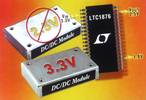IC eliminates DC-DC module in telecom boards
14 February 2001
Power Electronics / Power Management

Linear Technology's LTC1876 is a triple output DC-DC converter with two step-down outputs and one step-up output in a 36-lead SSOP package. This IC eliminates the need for a 2,5 V isolated DC-DC module in telecom systems, which require 3,3, 2,5 and 1,8 V rails. The LTC1876 offers as much as 50% savings by reducing the cost and inventory to only one isolated 3,3V DC-DC module for these telecom systems, says the manufacturer. The LTC1876 is used to convert the 3,3V output of the DC/DC module to two lower voltages at up to 15 A while achieving an operating efficiency as high as 90%. DC isolation is preserved since the 3,3 V input to the LTC1876 is isolated. Applications include telecom/networking infrastructure equipment, industrial CPU board, ATM trunk cards, Ethernet/ISDN boards and servers.
The LTC1876 allows the use of off-the-shelf 5V-logic N-channel MOSFETs for low-cost, product availability and high operating efficiency. It achieves the optimum 5 V gate drive capability by using its on-board 1 A step-up DC-DC regulator to boost the 3,3 input to 5 V. Alternative solutions require two ICs to accomplish the same task. They are more complex and also occupy more PC board space.
The LTC1876 comes in 36-lead SSOP package and is specified for -40 to +85°C.
Insight - Memec
(031) 764 3226
Further reading:
ABB’s Mission to Zero drives South Africa’s energy transition
ABB Electrification Products
Power Electronics / Power Management
ABB Electrification is charting a bold path towards a net-zero future with its Mission to Zero programme, a blueprint that combines energy efficiency, electrification, and digital innovation to accelerate the transition to clean energy.
Read more...
Energy harvesting using a battery-less IoT system
NuVision Electronics
Editor's Choice Power Electronics / Power Management
Energy Harvesting plays an essential role in the foundation of ambient IoT, a new generation of ultra-low power connected devices that operate by drawing energy from their environment instead of relying on traditional batteries.
Read more...
Driving power, defining performance
Future Electronics
Power Electronics / Power Management
Vishay’s portfolio of inductors, current sense resistors, and MOSFETs provides a comprehensive solution for intelligent power management.
Read more...
Battery simulator module simplifies BMS testing
Test Dynamics
Power Electronics / Power Management
The PXI/PXIe solution from Pickering Interfaces offers a scalable, modular design for faster development cycles, lower total cost of ownership, and improved safety.
Read more...
DC PSU: The cornerstone for efficient solar-storage systems
Vepac Electronics
Power Electronics / Power Management
PV energy storage systems are evolving and DC power supplies, with their technical characteristics that are naturally compatible with new energy, have become a key carrier for improving system energy efficiency.
Read more...
Why local manufacturing, maintenance and support are key to the success of South Africa’s energy future
Power Electronics / Power Management
Although new renewable generation capacity is being developed, the current transmission infrastructure may not fully support the connection of these sources to the national grid or adequately deliver power to areas of high demand.
Read more...
Converter power modules for 48 V networks
Altron Arrow
Power Electronics / Power Management
The economic and quality-of-life benefits of electrification is driving the adoption of HV to 48 V DC-DC conversion across many markets with 48 V power modules becoming more common.
Read more...
The importance of power integrity
Spectrum Concepts
Power Electronics / Power Management
[Sponsored] Behind every high-speed system lies the need for power integrity. Without it, even the cleanest signal paths become compromised.
Read more...
Precise multi-vital sign monitoring
Future Electronics
Power Electronics / Power Management
The AS7058 by ams OSRAM is an integrated multi-vital sign monitoring device, which provides a complete photoplethysmogram, electrocardiogram, body impedance sensor, and electrodermal activity sensor.
Read more...
Automotive battery diagnostics tester
Comtest
Power Electronics / Power Management
Midtronics’ MVT handheld battery tester is a revolutionary tool, powered by MDX-AI, which is set to redefine the standards of battery diagnostics and testing in the automotive industry.
Read more...


